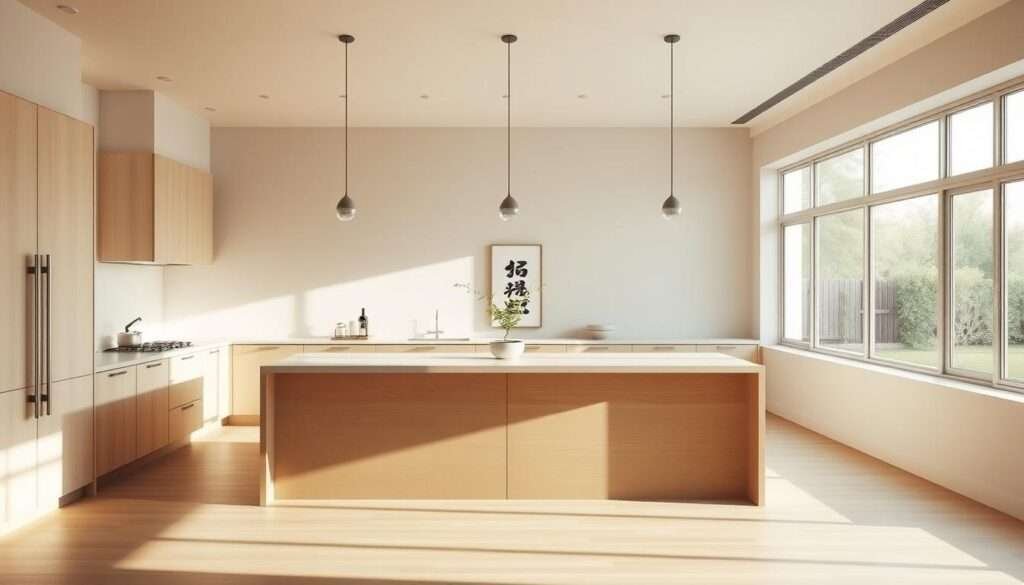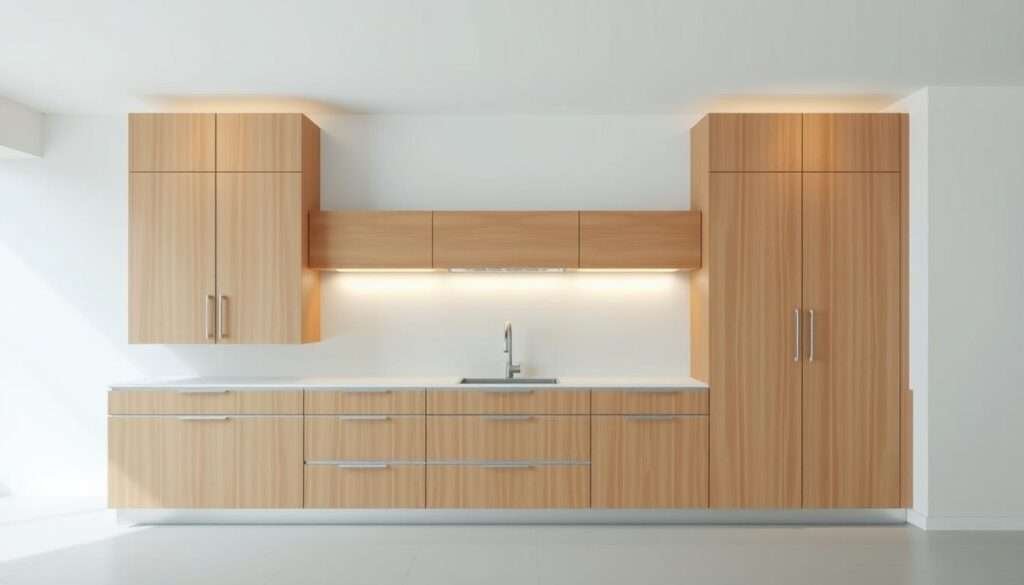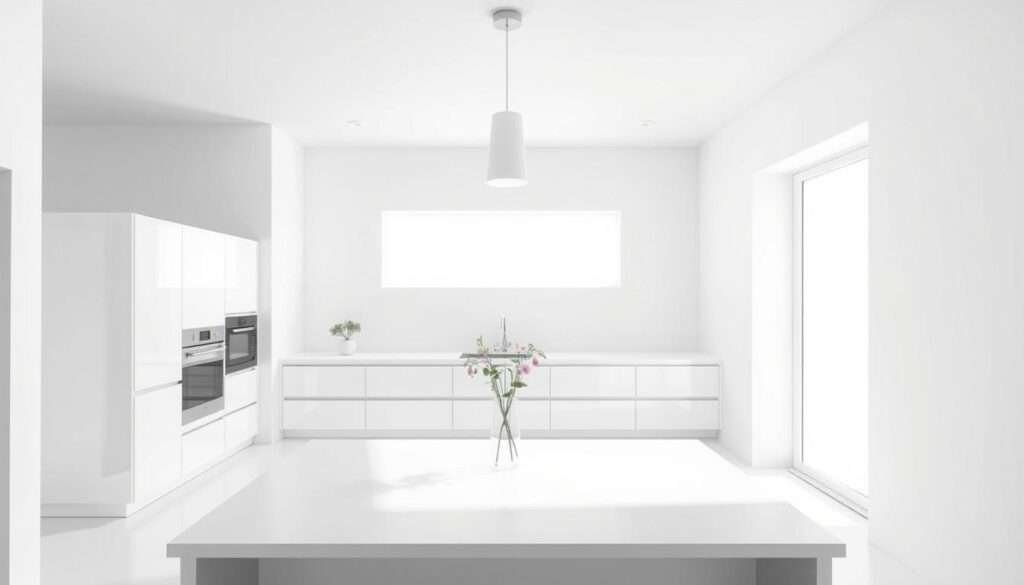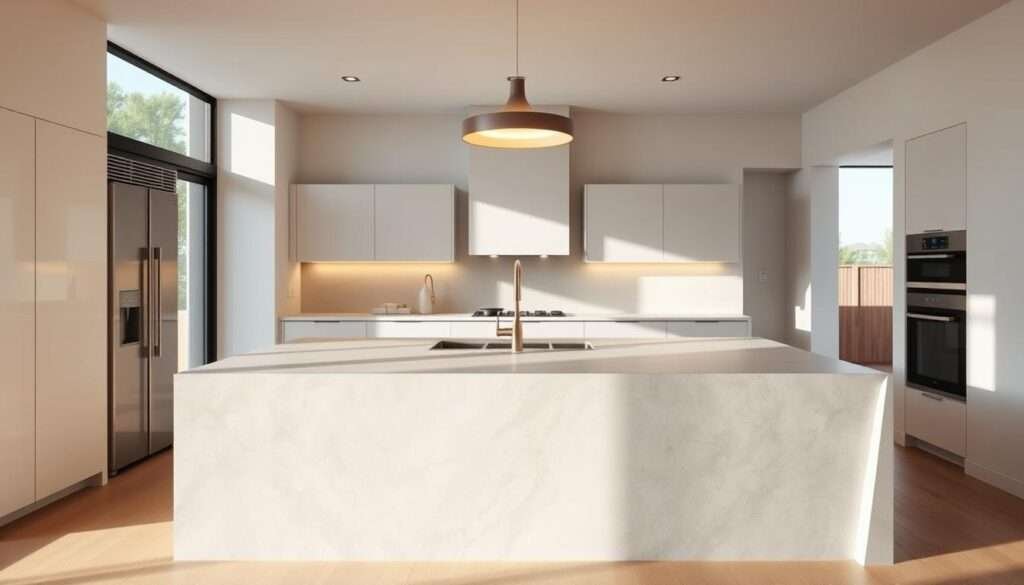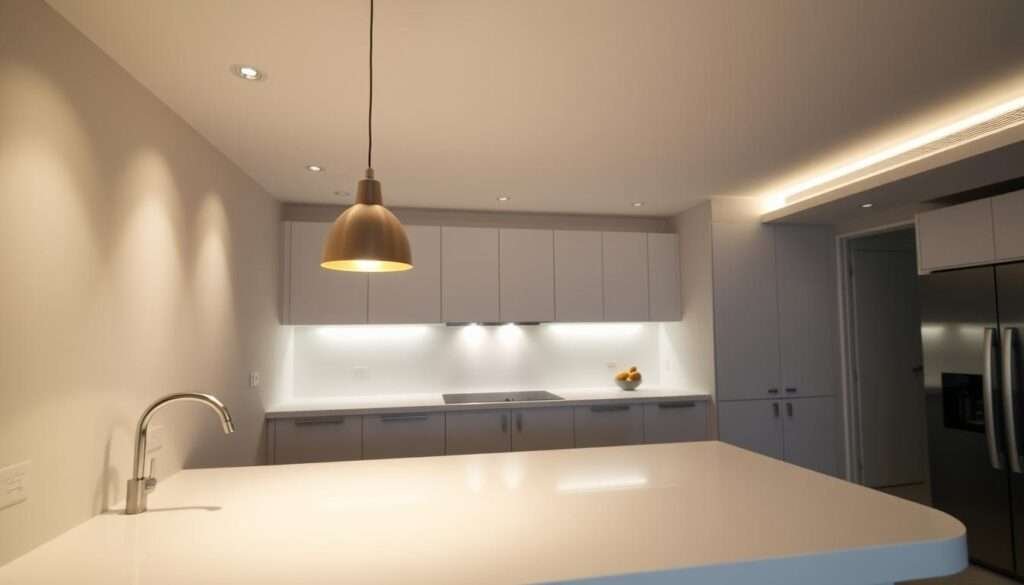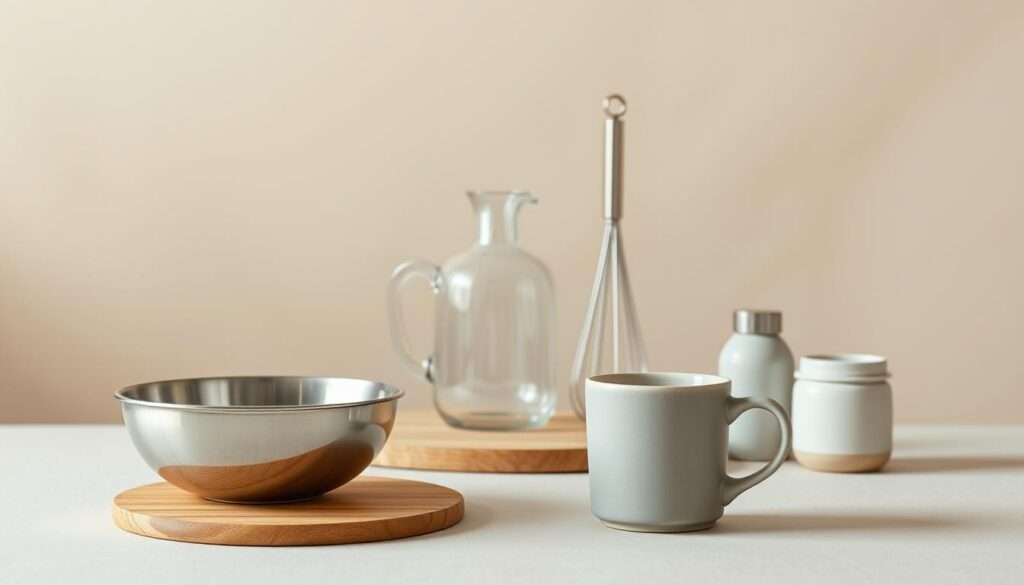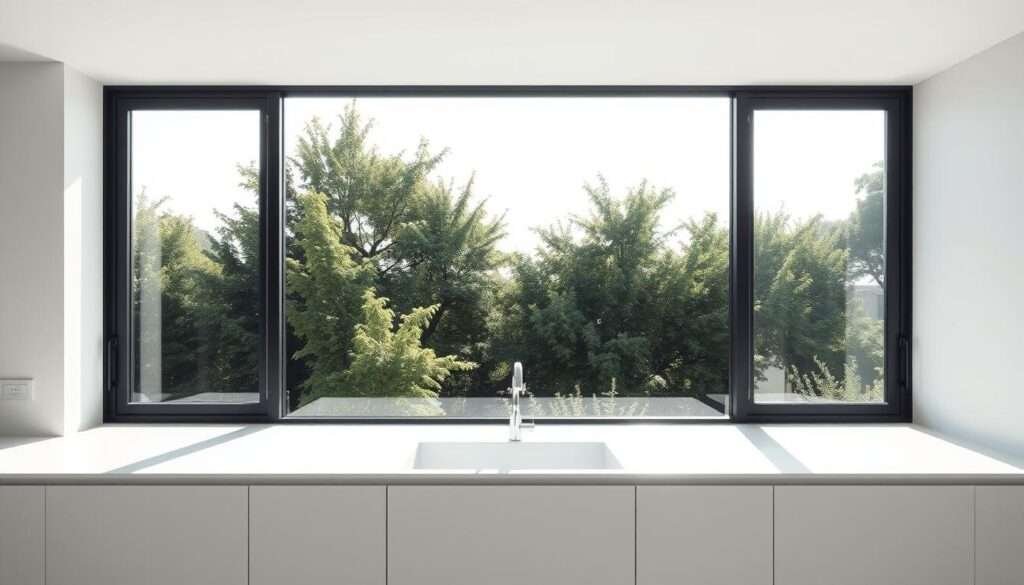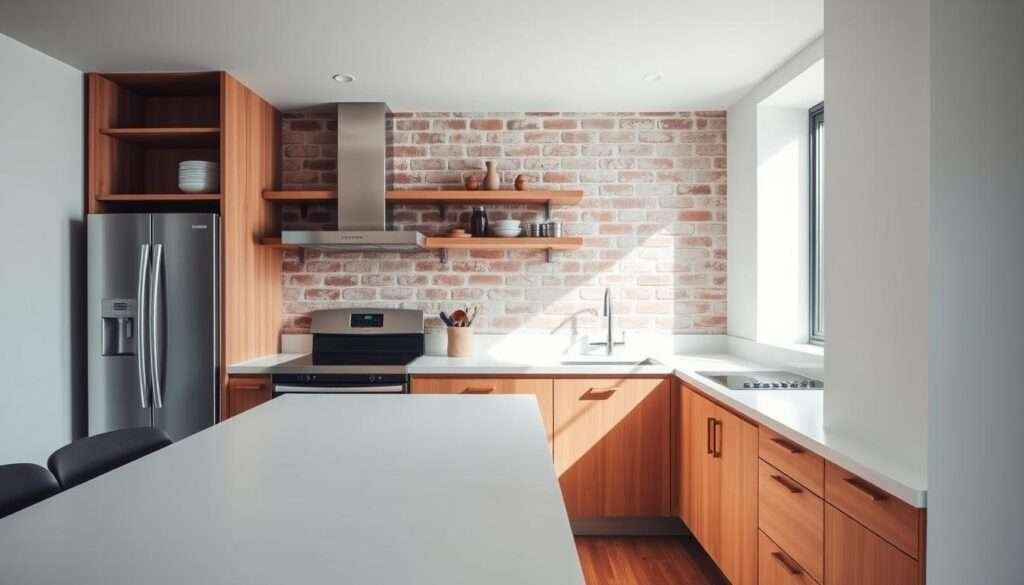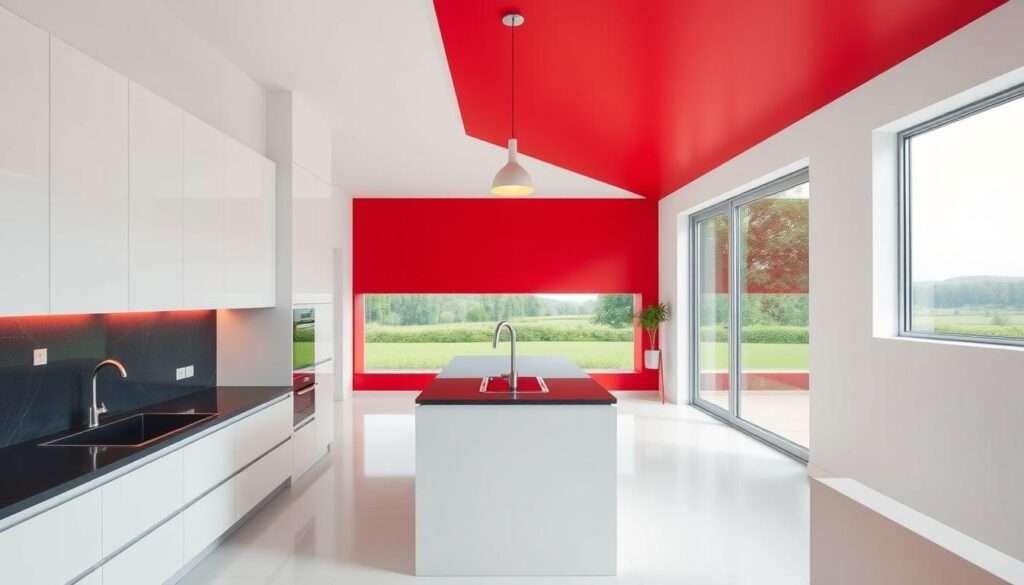Clean lines, open spaces, and smart storage define today’s most sought-after cooking areas. More homeowners are embracing simplicity, turning their spaces into calming retreats that blend beauty with practicality.
These designs focus on reducing clutter while maximizing efficiency. Think hidden storage, sleek cabinetry, and natural materials. Every detail serves a purpose without sacrificing style.
From folding glass doors to handcrafted tiles, real-world examples like Karen Smuland’s river-view space prove how function meets elegance. Whether you love neutral tones or bold accents, the right layout can transform your daily routine.
Ready to explore fresh ways to elevate your space? Let’s dive into inspiring solutions that balance form and function effortlessly.
Why Minimalist Kitchens Are the Ultimate Zen Spaces
A clutter-free cooking space fosters both relaxation and efficiency. By stripping away excess, these designs highlight what truly matters—thoughtful layouts and intentional details.
Clean Lines and Uncluttered Surfaces
Architect Karen Smuland’s folding glass doors blend indoor and outdoor spaces seamlessly. Concrete countertops add raw elegance without fuss. In Alex Robinette’s Austin kitchen, quartzite surfaces reflect light, amplifying the sense of calm.
Hidden compartments keep countertops empty. Lisa Hynes’ Miami kitchen hides appliances behind cabinetry, proving less visual noise means more spatial harmony.
Functionality Meets Aesthetic Pleasure
Jason Arnold’s white-oak cabinetry preserves his Nashville cottage’s charm while offering modern utility. Emily Millman’s honed quartzite island doubles as a prep station and gathering spot.
| Feature | Minimalist Kitchen | Traditional Kitchen |
|---|---|---|
| Storage | Hidden compartments | Visible shelves |
| Surfaces | Uninterrupted planes | Decorative edges |
| Appliances | Integrated | Freestanding |
Every choice serves a purpose. The result? A kitchen that feels as good as it looks.
20 Stunning Minimalist Modern Kitchen Ideas for Your Home
Simplicity meets sophistication in these carefully curated cooking spaces. I’ve gathered inspiring kitchen ideas that prove less decoration means more impact. Each numbered example showcases how intentional design creates harmony.
- Rift-sawn oak meets marble
Jason Kalman’s LA galley proves opposites attract. Warm wood cabinetry contrasts with cool Pietra Gray marble backsplashes. The combination adds depth while keeping surfaces clutter-free. - Metallic whispers
Erin Cantu’s space features Calacatta Gold marble with brass pulls. These subtle accents catch light without overwhelming. The effect? A kitchen that feels polished yet approachable. - Light as decoration
Paul Masi’s Corian-topped outdoor area uses strategic lighting. Recessed LEDs highlight the countertop’s smooth surface. At night, it becomes a glowing focal point. - Budget-conscious shelves
Helen Norman’s open shelving solution saves costs without sacrificing style. Displayed dishes become decorative elements. The trick? Keeping arrangements sparse and symmetrical. - Hardware as jewelry
Those brass pulls in Erin’s design show how details matter. When every item has purpose, even small choices elevate the entire space.
Whether you prefer bold material contrasts or quiet metallic touches, these approaches all share one trait. They celebrate empty space as much as the objects within it.
Sleek Cabinetry That Speaks Volumes
The right cabinetry transforms a kitchen from functional to extraordinary. In a minimalist kitchen, every detail matters—especially storage that blends seamlessly with clean lines.
Flat-Front vs. Shaker Styles
Flat-front cabinets offer a contemporary edge. Their unbroken surfaces amplify light and space, like Keystone Millworks’ white-oak design with Richelieu knobs. The grain patterns in stained oak add warmth without clutter.
Shaker styles bring subtle detailing. Their recessed panels work well in transitional spaces. Pair them with honed quartzite countertops for balance.
Hardware-Free Designs for Seamless Look
Touch-latch mechanisms eliminate handles for uninterrupted flow. Vesta’s custom cabinets in monochromatic kitchens prove less hardware means more focus on form.
When accents are needed, antique brass pulls act as jewelry. But remember: the beauty of minimalist cabinetry lies in its quiet confidence.
The Magic of Monochromatic Color Schemes
A single-color palette brings calm and focus to cooking spaces. Lauren Rubinstein’s stainless steel and chrome finishes prove how tonal variations add subtle intrigue. Glossy surfaces reflect light, while matte textures absorb it—creating depth without clutter.
Emily Millman’s earthy Calia Stone quartzite shows texture’s power. Veining mimics movement, and honed finishes feel organic. This approach turns simplicity into sophistication.
Restraint defines Alexis Litman’s Hamptons kitchen. Oak cabinetry dominates, with no competing hues. The result? A space that feels grounded and intentional.
Psychologically, monochrome spaces reduce visual noise. Chefs like Dominique Crenn note how limited palettes sharpen culinary focus. Fewer distractions mean better flow.
Keeping light palettes pristine is easier than you think. Microfiber cloths lift stains from quartzite, while sealed cabinetry resists fingerprints. For chrome, vinegar cuts grease without streaks.
Maximizing Space with Smart Storage Solutions
Smart storage turns tight spaces into functional masterpieces. I’ve seen narrow kitchens transform with vertical solutions like floor-to-ceiling cabinets. Juggernaut Woodworking’s island with a PentalQuartz top hides pull-out spice racks, proving even compact areas can work harder.
Hidden Compartments and Pull-Out Drawers
Glass-front cabinets create depth, while solid doors conceal clutter. Helen Norman’s designs use frosted panels to mask appliances, blending form and function. For corners, carousel drawers maximize every inch—no more lost pots.
Open Shelving Done Right
Weight limits matter: reinforced brackets support stone or thick wood shelves. Style them with three rules—group items in odd numbers, leave 30% empty, and mix textures. Think hand-thrown ceramics beside sleek canisters for contrast.
For more small kitchen ideas, explore tiered shelving or floating designs. The goal? A space that feels open, even when every shelf serves a purpose.
Kitchen Islands That Double as Statement Pieces
A well-designed island becomes the heart of any cooking space. It’s where meals come together, conversations flow, and design shines. With the right touches, this centerpiece balances utility and artistry.
Waterfall Countertops for Drama
Waterfall edges turn countertops into sculptural elements. Unlike standard installations, the material cascades down the sides, creating a seamless flow. Quartz or marble choices amplify the effect, especially with bold veining.
For contrast, pair a dark stone island with light perimeter cabinetry. The overhang should extend 12–15 inches for comfortable seating. Add Visual Comfort pendants above to highlight the countertop’s elegance.
Choosing the Perfect Stools
Stools bridge style and function. McGee & Co’s Williamsen designs offer molded plastics for easy cleaning, while Mater’s oak-and-leather High Stools add warmth. Fabric options suit cozy spaces but require more upkeep.
Keep proportions in mind: 24–26 inches tall for standard islands, 30 inches for bar-height. Neutral tones blend seamlessly, but a pop of color can define the space.
Let There Be Light: Minimalist Lighting Ideas
Lighting shapes the mood and functionality of any cooking space. In minimalist designs, fixtures should enhance simplicity while adding warmth. The right balance makes tasks easier and highlights key features.
Pendant Lights as Focal Points
Gubi Ronde pendants in river-view kitchens prove scale matters. For clusters, odd numbers (3 or 5) create rhythm. Keep them 30–36 inches above islands for visibility.
Matte black finishes absorb light for subtlety, while polished brass reflects it. Aerin for Visual Comfort & Co.’s Agnes pendants blend both—matte bases with glossy interiors.
| Feature | Pendant Lights | Recessed Lighting |
|---|---|---|
| Best For | Islands, dining zones | Low ceilings, task areas |
| Installation | Hanging, adjustable | Flush with ceiling |
| Impact | Decorative focal point | Subtle ambiance |
Recessed Lighting for Subtle Ambiance
LED strips under cabinets illuminate workspaces without glare. Choose 2700K–3000K color temperatures—warmer tones flatter wood and stone.
Dimmer systems adapt to needs: bright for cooking, soft for dining. In multi-functional spaces, layered lighting ensures flexibility.
Lighting isn’t just functional. It’s the unseen hand that guides how we experience a space.
Backsplashes That Blend Form and Function
Backsplashes serve as both protective barriers and design statements. In Karen Smuland’s kitchen, Heath Ceramics tiles add texture without overwhelming the space. Suzanna Scott’s beach house features Ann Sacks glass tiles that reflect light beautifully.
Full-height installations create a seamless look, ideal for small kitchens. Partial backsplashes work well with bold countertops, like Danby marble. Its non-porous surface resists stains, making cleanup effortless.
Grout color matters. Match it to your tile for a monolithic effect or contrast it for definition. Neutrals like “Platinum” or “Alabaster” keep the focus on materials.
Ditch subway tiles for geometric patterns. Hexagons or fish-scale designs add movement. For metallic flair, stainless steel inserts pair well with monochromatic schemes.
Every choice should balance durability and style. Whether you prefer handcrafted ceramics or sleek marble, let your backsplash tell a story.
Materials to Elevate Your Minimalist Kitchen
Material choices define the soul of a minimalist space, blending durability with quiet elegance. The right surfaces enhance functionality while creating visual harmony. Let’s explore how quartzite, wood, and marble can transform your cooking area.
Quartzite for Understated Luxury
Architectural Tile & Stone’s quartzite offers rugged beauty with low maintenance. Unlike quartz, it’s naturally heat-resistant but requires sealing yearly. Calia Stone’s honed white-crystal quartzite adds subtle texture, perfect for busy homes.
| Feature | Quartz | Quartzite |
|---|---|---|
| Maintenance | No sealing | Annual sealing |
| Heat Resistance | Moderate | High |
| Appearance | Uniform | Natural veining |
Warmth of Natural Wood Accents
Wood brings organic warmth to sleek designs. Oiled finishes highlight grain patterns but need reapplying. Lacquered options resist stains better, ideal for countertops or cabinetry.
Pair wood with matte metals like brushed nickel for contrast. This combo balances rustic charm with modern minimalism.
Marble’s Timeless Appeal
Marble countertops remain a classic, with veins telling unique stories. Opt for honed finishes to hide etching. Danby marble’s gray undertones work well in monochromatic schemes.
Sustainable alternatives like recycled glass offer similar elegance. Their speckled surfaces add movement without overpowering the space.
Neutral Palettes for a Calming Effect
Soft hues and natural materials bring harmony to minimalist designs. These palettes create spaces that feel both intentional and inviting. The right balance of tones can make even busy areas appear serene.
Gray undertones offer remarkable versatility. Benjamin Moore’s Carter Gray works beautifully on islands, providing contrast against lighter uppers. Warm grays pair well with wood, while cool tones complement marble and steel.
Strategic color placement guides the eye. Darker shades on lower cabinets ground the space, keeping uppers light and airy. Lisa Hynes’ Miami kitchen shows how maple shelving adds warmth without overwhelming.
Natural materials enhance neutral palettes. Unfinished woods, linen textiles, and stone surfaces add organic texture. These elements prevent monotony while maintaining a cohesive look.
Lighting dramatically affects color perception. North-facing rooms benefit from warm whites, while southern exposures handle cooler tones. Layer ambient and task lighting for accurate color rendering.
Choose durable finishes for high-traffic zones. Eggshell or satin paints resist stains better than flat finishes. For cabinetry, semi-gloss provides easy cleaning without excessive shine.
A thoughtful color palette creates visual calm. By balancing tones and textures, you achieve a space that feels both polished and peaceful.
Appliances That Disappear into the Design
Modern kitchens thrive when appliances vanish into the architecture. The right choices create a cohesive look, letting cabinetry and countertops shine. I’ve seen how Sub-Zero’s integrated refrigeration and Wolf’s concealed ranges turn functional items into design secrets.
Integrated Refrigerators
Panel-ready refrigerators blend with cabinetry for a seamless look. Sub-Zero’s models offer custom panels that match oak or lacquered finishes. Stainless steel alternatives suit industrial themes but demand more upkeep.
Smart integration matters. Wi-Fi-enabled units alert you to temperature changes, while split designs optimize space. For ventilation, downdraft systems hide cooktop exhausts without bulky hoods.
Panel-Ready Dishwashers
Dishwashers with matching fronts maintain visual flow. Bosch’s 800 Series pairs with Shaker doors, disguising tech beneath simplicity. Budget-friendly? Look for IKEA’s ENERGY STAR models with customizable panels.
Handle alignment is key. Match cabinet pulls or opt for touch-latch mechanisms. This subtle detail ensures appliances don’t disrupt the minimalist kitchen’s rhythm.
- Finishes: Matte cabinets hide fingerprints better than glossy stainless steel.
- Ventilation: Pop-up downdraft vents work for islands.
- Smart Tech: Voice-controlled ovens sync with lighting systems.
When appliances fade into the background, the space feels intentional. It’s not just about hiding—it’s about elevating the entire room’s harmony.
Less Is More: Decluttering Countertops
A clear countertop isn’t just visually pleasing—it transforms how you use your space. Helen Norman’s hidden appliance storage shows how to tackle clutter without sacrificing style. Start by categorizing items: daily essentials stay accessible, while occasional tools tuck away.
Vertical storage maximizes small kitchens. Install floating shelves for spices or mount magnetic strips for knives. Jason Donnelly’s pull-out drawers keep countertops empty yet functional. For tech, integrate charging stations into cabinets to avoid tangled cords.
Appliance garages with retractable doors hide blenders and toasters. Choose designs that blend with cabinetry for a seamless look. Decorative items should serve a purpose—like handcrafted cutting boards that double as wall art.
Every inch counts. By focusing on intentional design, you create a kitchen that feels open and efficient. Less clutter means more room to breathe—and cook.
Bringing the Outdoors In with Large Windows
Floor-to-ceiling windows blur boundaries, inviting nature into your cooking space. Paul Masi’s pocket doors fold away completely, merging indoor prep areas with outdoor dining. Reid A. Morgan Jr.’s Lake Washington views showcase how glass amplifies natural light.
Skip heavy drapes—minimalist designs thrive with sheer shades or motorized blinds. For energy efficiency, opt for double-glazed glass with low-E coatings. These reduce heat transfer while maintaining clarity.
Extend flooring materials like limestone or oak from indoors out. This continuity tricks the eye, making small kitchens feel expansive. Place windows above sinks to frame views while washing dishes.
Reflective surfaces multiply sunlight. A glossy backsplash or polished countertop bounces light deeper into the room. Pair with matte finishes to balance glare.
Large windows aren’t just portals; they’re design tools. They reshape perceptions of space and add organic warmth. Let the outdoors inspire your next meal.
Mixing Textures Without the Chaos
Texture adds depth to minimalist spaces when balanced thoughtfully. I’ve seen kitchens come alive with layered materials that create visual interest without clutter. The secret lies in strategic contrast—pairing smooth with rough, matte with glossy.
Matte Finishes vs. Glossy Surfaces
Matte cabinets absorb light, creating a soft, grounded feel. Lauren Sloan’s faux-concrete finishes prove how matte textures add warmth to modern spaces. For durability, consider lacquered MDF—it resists fingerprints better than dry concrete.
Glossy surfaces reflect light, making small kitchens appear larger. A 70/30 ratio works best: mostly matte with strategic glossy accents. Try high-gloss backsplashes behind matte cabinetry for subtle contrast.
| Finish Type | Best For | Maintenance |
|---|---|---|
| Matte | Cabinets, walls | Easy to clean |
| Glossy | Backsplashes, countertops | Shows smudges |
| Satin | Hardware, fixtures | Balanced look |
Rattan and Metal Combinations
Natural materials like rattan bring organic warmth to sleek designs. Serena & Lily’s woven pendants add texture overhead without visual weight. Pair rattan chairs with marble-topped islands for perfect contrast.
Metallic accents in cabinet pulls or light fixtures add refinement. Brass or nickel details work well against wood tones. Keep metal touches minimal—think drawer handles or faucets rather than full appliance fronts.
- Layer textures vertically: smooth countertops, woven lighting, matte floors
- Use the “three texture rule”: one dominant, two supporting
- Repeat materials elsewhere for cohesion (e.g., matching wood tones)
Texture transforms sterile spaces into inviting ones. When balanced right, these elements create harmony rather than chaos.
Minimalist Kitchens with Bold Accent Colors
A splash of bold color can redefine a minimalist space without overwhelming it. Take Brie Williams’ navy blue cabinetry—it anchors her kitchen while keeping the clean lines intact. Joyelle West’s muted green backsplash shows how earthy tones add warmth without clutter.
Color zoning techniques help control visual impact. Paint lower cabinets a deep hue, like charcoal or indigo, and keep uppers white. This grounds the space while maintaining airiness. For open shelving, display colorful ceramics against neutral walls.
- Removable accents: Swap stools or pendant shades seasonally. McGee & Co’s leather stools in burnt orange offer flexibility.
- High-impact, low-commitment: Try a vibrant rug or dishware. These pops are easy to change.
- Colored appliances: Smeg’s pastel refrigerators or Bertazzoni’s crimson ranges make functional statements.
| Base Palette | Accent Color | Effect |
|---|---|---|
| White | Navy | Classic contrast |
| Warm gray | Terracotta | Organic warmth |
| Black | Emerald | Modern drama |
Balance is key. Limit bold accents to 10–15% of the space. A monochromatic palette ensures cohesion, letting those fiery red bar stools or cobalt tiles shine.
Small-Space Minimalism: Tips for Tiny Kitchens
Compact kitchens demand smart solutions that maximize every inch. Jason Kalman’s galley layout proves how thoughtful design can turn tight spaces into highly functional areas. The key lies in prioritizing essentials while keeping surfaces clutter-free.
Multifunctional furniture saves precious space. Fold-down tables attach to walls, providing dining surfaces that vanish when not needed. Edmund Barr’s stacked tile backsplash adds visual height, making ceilings appear taller.
- Appliance scale matters: Choose slim refrigerators and compact dishwashers. Look for 18-inch models instead of standard 24-inch ones.
- Vertical storage solutions: Install shelves up to the ceiling for rarely used items. Use labeled bins for easy access.
- Reflective surfaces: Glass tile backsplashes bounce light around, creating depth in narrow areas.
- Sliding doors: Replace swinging cabinet doors with space-saving sliding panels or pocket doors.
| Feature | Small Kitchen Solution | Standard Kitchen |
|---|---|---|
| Counter Space | Fold-out extensions | Fixed islands |
| Storage | Vertical organizers | Horizontal cabinets |
| Appliance Size | Compact models | Full-size units |
For more inspiration, explore minimalist kitchen ideas that balance form and function. Glass-front cabinets maintain openness while concealing clutter—perfect for displaying essential dishware.
Light colors enhance small spaces. Paint walls and cabinets the same soft hue to blur boundaries. Add texture with woven baskets or wood accents to prevent a sterile feel.
Every decision should serve multiple purposes. From foldable stools to magnetic knife strips, smart choices transform limitations into advantages. A well-planned small kitchen can outperform larger, cluttered spaces.
Your Minimalist Kitchen Awaits – Start Designing Today
Creating a clutter-free space that balances beauty and practicality is easier than you think. Focus on simplicity, quality materials, and smart layouts. These principles transform any home into a calming retreat.
Personal touches make the design yours. Try textured backsplashes or warm wood accents. Professional help ensures seamless execution—consider Design Within Reach for curated pieces.
Ready to begin? Use Beril’s renovation planner to map your vision. Brands like Heath Ceramics and Sub-Zero offer durable, stylish options. Start small: declutter first, then layer in functional details.
Your dream space is within reach. Embrace clean lines and purposeful choices. The result? A kitchen that works as beautifully as it looks.

